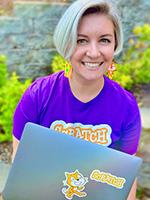Exploring Scratch and AI: Pitfalls and Possibilities
,
Colorado Convention Center, Innovation Arcade: AI Exploration Lab B, Table 1
Presenters


Session description
Purpose & objective
Explore the possibilities and pitfalls of AI using Scratch Lab's experimental blocks to create games, interactive stories, and accessible projects.
- Understand the basic definitions of AI, predictive AI, and generative AI
- Gain hands-on experience using predictive AI via Face Sensing with Scratch Lab
- Reflect on ways AI can be integrated into activities in support of creative learning and discuss generative AI integration with Scratch
- Remix and/or adapt starter projects and test the limits of the AI by trying to fool it and see what faces aren't seen (false negatives) and what non-human faces are recognized (false positives)
Outline
Session Introduction [10 minutes]
- Introduce facilitators
- Creative learning warm up: interactive activity based on the “See, Think, Wonder” protocol
- Share Creative Learning Framework - Creative Learning Spiral & 4Ps of Creative Learning (Projects, Passion, Peers, and Play)
- Share session objectives
Mind the Gaps [5 minutes]
- Interactive discussion related to deepening confidence as Artificial Intelligence (AI) creators using (a) starter poll, (b) sticky note idea generation, and (c) identifying shared takeaways
- Ideas to be surfaced relate to: AI in everyday life, experience creating with AI, gaps in understanding the technology, value of integrating AI into classroom learning.
Dupe the Machine [20 minutes]
- The majority of the session will focus on hands-on experimentation with Scratch Lab’s Face Sensing blocks with participants using their own devices.
- Facilitators will begin with an introductory demo and invite participants to explore the edges of the technology by creating a project with the following prompts: What does the system perceive as a face?
Can you fool it? What limitations can you find? Does it see a simple drawing of a face as a face? What about animal faces?
Create-Along [10 minutes]
- Facilitators will lead a collaborative create-along using a freely accessible AI text and image generation platform (Bing Chat).
- Participants will be asked to share their experiences using generative AI for creative learning or creative coding via sticky note idea generation.
- Facilitators will share examples of interdisciplinary educator-developed lessons using AI text and image generation to brainstorm new project ideas, original characters, support with debugging code, and help develop intelligent non-player characters (NPCs).
- Lesson links will be included in the associated session Educator Guide.
Closing [10 minutes]
The closing segment will focus on participants reflecting on their workshop experience both as learners and as educators.
- Facilitators will prompt peer-to-peer turn and talk discussion with the following questions: What are your key takeaways from exploring the integration of AI and block based programming? How might you adapt these activities for your learners? Are there any risks or roadblocks to using AI with students?
- Facilitators will share discussion prompts for classroom discourse, persuasive writing, or debate based on questions of the pitfalls and possibilities of AI, including but not limited to: What are the ethical implications of what facial recognition software sees and can’t see? What if you don’t want to be seen? Can AI technology help make humans more intelligent? More creative?
Supporting research
The core research, documentation, and websites we have used to design this workshop are remixed or adapted from the following sources:
"AI and Creative Learning: Concerns, Opportunities, and Choices," blog post by Mitch Resnick
https://mres.medium.com/ai-and-creative-learning-concerns-opportunities-and-choices-63b27f16d4d0
"Exploring a Creative, Safe Introduction to Machine Learning," blog post by Eric Rosenbaum
https://medium.com/scratchteam-blog/exploring-a-creative-safe-introduction-to-machine-learning-c42f1d0133e7
"Inside Scratch Lab: AI Image Generation," blog post by Eric Rosenbaum
https://medium.com/scratchteam-blog/inside-scratch-lab-ai-image-generation-179f11bd921a
The RAISE Playground
https://playground.raise.mit.edu/
The RAISE Playground is a block-based programming platform that we developed to support hands-on learning about AI and robotics for students and beginning programmers.
MIT AI Ethics Education Curriculum https://docs.google.com/document/d/1e9wx9oBg7CR0s5O7YnYHVmX7H7pnITfoDxNdrSGkp60/view
A set of activities, teacher guides, assessments, materials, and more to assist educators in teaching about the ethics of artificial intelligence.
Teachable Machine
https://teachablemachine.withgoogle.com/
Teachable Machine is a web-based tool that makes creating machine learning models fast, easy, and accessible to everyone.
Face Sensing with Scratch Lab
https://resources.digitalmoment.org/sensing-faces-with-scratch-lab/
A hands-on activity from Digital Moment, with a focus on sparking “curiosity about how computers recognize patterns in the era of AI and how we can work with intelligent machines to amplify our own creations.”
AI and Scratch coding with FabLab Onaki
https://www.youtube.com/watch?v=N35-1Otn-Hc
FabLab Onaki is the first indigenous Fablab in Canada, established by The First Peoples Innovation Centre (FPIC), they offer training for Indigenous youth and young adults in digital technologies. This video chronicles in-person and virtual workshops in which participants explored Artificial Intelligence with a coding focus.
Introduction to Machine Learning and AI
https://teachcomputing.org/courses/CO231/introduction-to-machine-learning-and-ai?utm_campaign=Resend%20of%20NCCE%20Secondary%20CPD%20Listing%20-%20September%2023&utm_content=AI_Course&utm_term=&utm_medium=email&utm_source=Adestra
A course developed by the National Center for Computing Education developed for CS teachers to “discover the fundamentals of machine learning, how it works, and learn to train your own AI using free online tools.”
Session specifications
Citizen
- Establish a learning culture that promotes curiosity and critical examination of online resources and fosters digital literacy and media fluency.
Empowered Learner
- Students understand the fundamental concepts of technology operations, demonstrate the ability to choose, use and troubleshoot current technologies and are able to transfer their knowledge to explore emerging technologies.
- Students create original works or responsibly repurpose or remix digital resources into new creations.
 Return
Return Innovation arcade: Exploration lab
Innovation arcade: Exploration lab  Trips and Tours
Trips and Tours